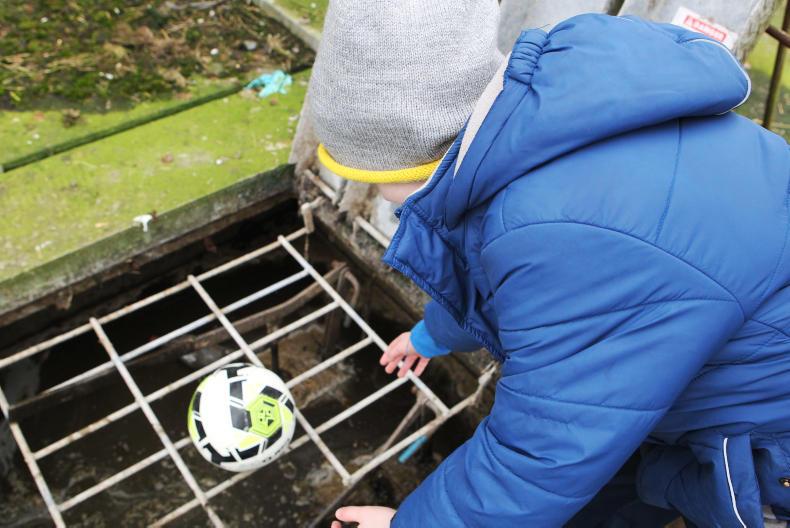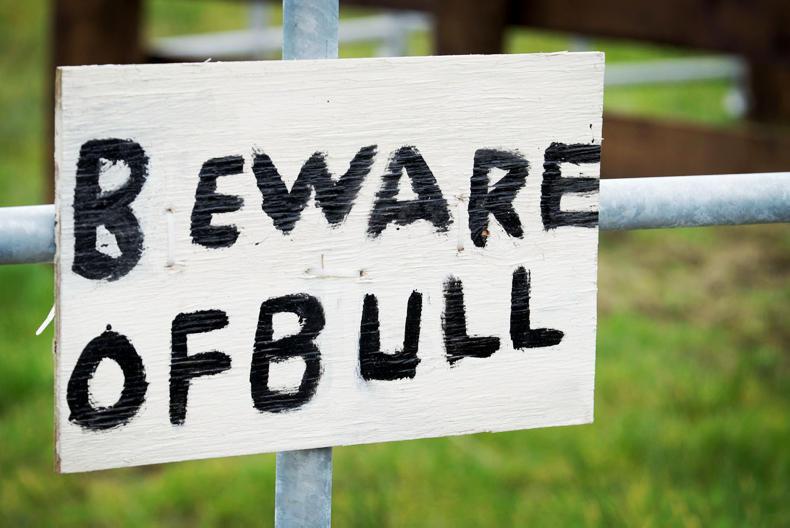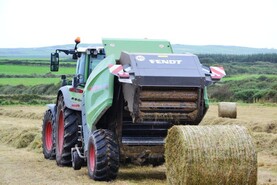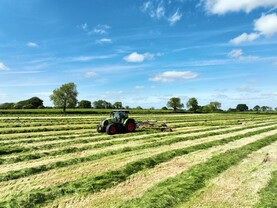Children are like sponges and soak a huge amount of information up in a very short space of time. It could be argued that they are quicker than adults at listening to important messages and adhering to rules, in general. How many times have you been reminded by your children to put on your seat belt or put down the phone while driving? I know I have. Are we missing a trick with children and our farm safety message? If we channel this message through children, it could have a greater impact on actions and work practices around Irish farms. We have been selling the message to the older generation for a long time with a variable level of success. Is it time to concentrate more on the younger generation. This week, we look at some tips on how to keep children safe on farms.

Children over seven are allowed to be a passenger in a tractor but there needs to be a clear distinction between when the tractor is going for a spin or if it is at work.
Children on tractors – know the law
Sixty-eight per cent of fatal accidents to children on farms are associated with the use of tractors and machinery and it’s by far the biggest cause of child fatalities in the industry. While many farmers are of the opinion that a child is safer on the tractor than around the yard, the law states that a child under seven must not be inside the cab of a tractor. The thinking behind this law is that is it not possible for a farmer to concentrate on the task at hand on the tractor while also watching a child under seven within the cab.
Children aged between seven and 16 should only ride in a tractor if there is a properly fitted passenger seat with seat belts inside the cab. Children under 14 years of age should never operate tractors or self-propelled machines. A child over 14 should only be allowed to drive a tractor if a formal training course has been completed. Close supervision of drivers aged over 14 is advised.
Care should also be taken when vehicles are not in use that keys are removed, the handbrake is applied, all implements are lowered to ground level and all doors are locked.

All children under 12 should be fully supervised on the farm.
Play area
A safe and secure play area for children should be provided away from the farm yard and in full view of the dwelling house. This area should be fenced off with access gates capable of being locked and escape-proof. If a safe and secure area is not available, a high level of adult supervision is required. Children should not be allowed to access heights such as climbing ladders or hay bales.

A section of a safe outdoor toddler play area, which also has an enclosed end for shelter.
Livestock
Make sure children know the dangers associated with livestock. Children should not be allowed near dangerous animals such as bulls, stallions or rams and female animals with newborn young. Animals can perceive young children as a threat which can result in aggressive behaviour. Children should not be present at high-risk times such as loading livestock, animal handling in crush areas or at calvings.
Communicate the issues
Sit down with children on the farm and talk about the dangerous hazards that exist on the farm. Communicate the areas which are off limits and take time to explain why. Make sure that any visitors to the farm such as cousins or friends are aware of the dangers associated with the farmyard.
AgriKids
AgriKids is a farm safety resource for kids, parents and teachers, developed by Alma Jordan based in Julianstown, Co Meath. It aims to teach kids farm safety in a fun way. “From as far back as I can remember, outdoors was the only way to play. Living on a farm meant there was always plenty of room and plenty to do. I am also passionate about keeping safe when on the farm or when out enjoying the countryside,” Alma said. “I founded AgriKids in late 2014 in the midst of Ireland’s worst year on record for farm safety. I wanted a new approach to farm safety awareness.”
This approach has led to positive engagement, educating and empowering young children to be farm safety ambassadors. For more farm safety material and details on AgriKids, see www.agrikids.ie.
Children are like sponges and soak a huge amount of information up in a very short space of time. It could be argued that they are quicker than adults at listening to important messages and adhering to rules, in general. How many times have you been reminded by your children to put on your seat belt or put down the phone while driving? I know I have. Are we missing a trick with children and our farm safety message? If we channel this message through children, it could have a greater impact on actions and work practices around Irish farms. We have been selling the message to the older generation for a long time with a variable level of success. Is it time to concentrate more on the younger generation. This week, we look at some tips on how to keep children safe on farms.

Children over seven are allowed to be a passenger in a tractor but there needs to be a clear distinction between when the tractor is going for a spin or if it is at work.
Children on tractors – know the law
Sixty-eight per cent of fatal accidents to children on farms are associated with the use of tractors and machinery and it’s by far the biggest cause of child fatalities in the industry. While many farmers are of the opinion that a child is safer on the tractor than around the yard, the law states that a child under seven must not be inside the cab of a tractor. The thinking behind this law is that is it not possible for a farmer to concentrate on the task at hand on the tractor while also watching a child under seven within the cab.
Children aged between seven and 16 should only ride in a tractor if there is a properly fitted passenger seat with seat belts inside the cab. Children under 14 years of age should never operate tractors or self-propelled machines. A child over 14 should only be allowed to drive a tractor if a formal training course has been completed. Close supervision of drivers aged over 14 is advised.
Care should also be taken when vehicles are not in use that keys are removed, the handbrake is applied, all implements are lowered to ground level and all doors are locked.

All children under 12 should be fully supervised on the farm.
Play area
A safe and secure play area for children should be provided away from the farm yard and in full view of the dwelling house. This area should be fenced off with access gates capable of being locked and escape-proof. If a safe and secure area is not available, a high level of adult supervision is required. Children should not be allowed to access heights such as climbing ladders or hay bales.

A section of a safe outdoor toddler play area, which also has an enclosed end for shelter.
Livestock
Make sure children know the dangers associated with livestock. Children should not be allowed near dangerous animals such as bulls, stallions or rams and female animals with newborn young. Animals can perceive young children as a threat which can result in aggressive behaviour. Children should not be present at high-risk times such as loading livestock, animal handling in crush areas or at calvings.
Communicate the issues
Sit down with children on the farm and talk about the dangerous hazards that exist on the farm. Communicate the areas which are off limits and take time to explain why. Make sure that any visitors to the farm such as cousins or friends are aware of the dangers associated with the farmyard.
AgriKids
AgriKids is a farm safety resource for kids, parents and teachers, developed by Alma Jordan based in Julianstown, Co Meath. It aims to teach kids farm safety in a fun way. “From as far back as I can remember, outdoors was the only way to play. Living on a farm meant there was always plenty of room and plenty to do. I am also passionate about keeping safe when on the farm or when out enjoying the countryside,” Alma said. “I founded AgriKids in late 2014 in the midst of Ireland’s worst year on record for farm safety. I wanted a new approach to farm safety awareness.”
This approach has led to positive engagement, educating and empowering young children to be farm safety ambassadors. For more farm safety material and details on AgriKids, see www.agrikids.ie.









 This is a subscriber-only article
This is a subscriber-only article











SHARING OPTIONS: